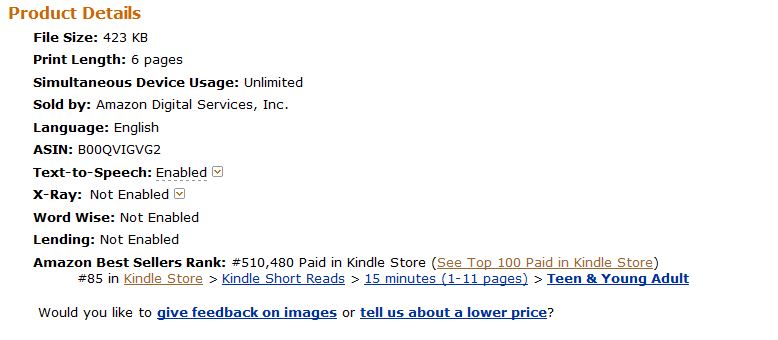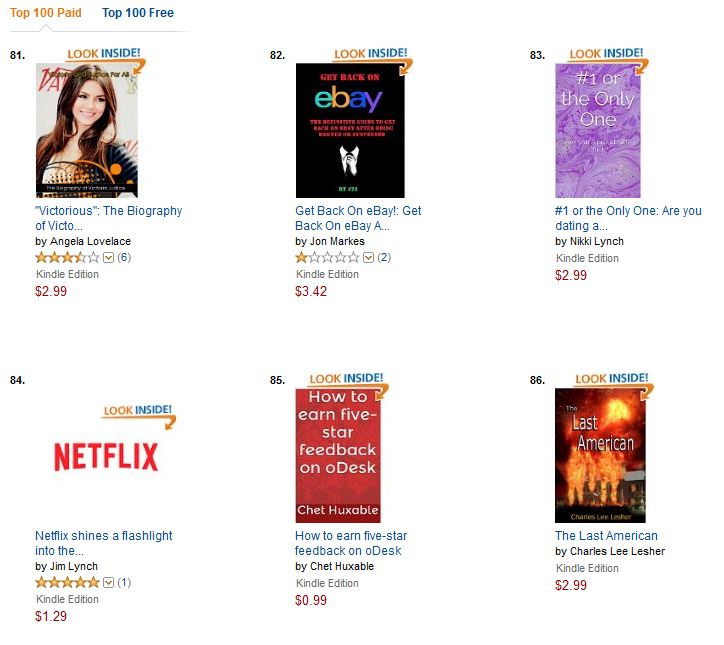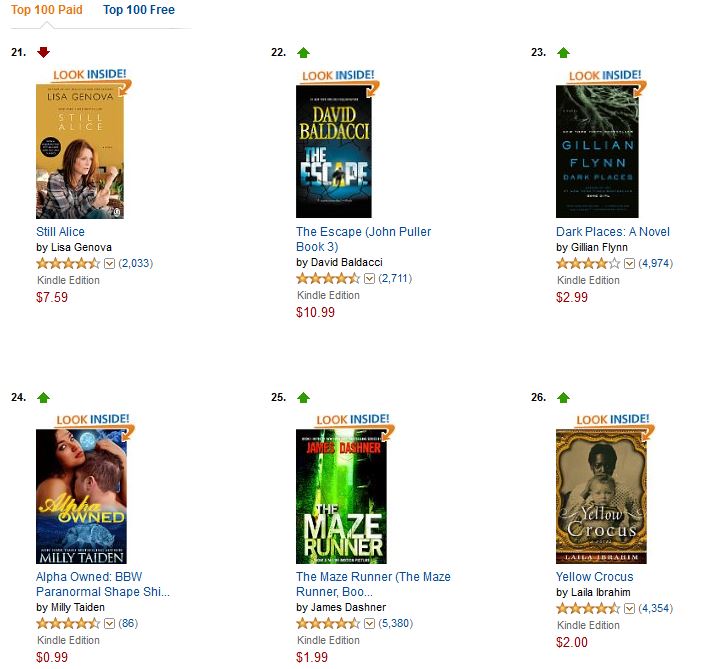
I just cracked the Amazon’s top 100. Right now I’ve got a book sitting at #85 in the Kindle Short Reads section.
In honor of this historic event, I’m going to tell you why eBook sales and rankings are bullsh*t. Strap yourselves in for a wild ride.
Dead niches mean nothing
So I cracked the top 100, pretty cool right?
Well it would be, if I actually made any money from my efforts.
As an experiment I decided to take my post on earning 5 star oDesk feedback and turn it into a little eBook. I used the pseudonym “Chet Huxable” and quickly whipped up a title. The results were exactly what you’d have expected.

(That’s me!)

(I pulled the book before publishing this)
As you can see from this screen shot, I moved two units all month.
Two units!
And it was still enough to get me ranked in the top 100.
If I were a jerk I’d withhold the sales figures and boast about my publishing skills. “Buy my $9 eBook about cracking Amazon’s Top 100,” I’d say. But I’m not a jerk. And because of that I’ll give you some very serious advice:
Writing “How To” and self-help books is generally a huge waste of time.
Case Study: Gary and Larry
Gary and Larry are both young men with an interest in making money online. Each of them decides to write an eBook for fun and profit.
Gary follows the Tim Ferriss method. He chooses a “How To” subject, does his research, finds some articles to plagiarise, and spends six hours cobbling together his book. It’s titled How To Become More Confident and clocks in at 5,000 words, or 25 pages.
Gary publishes his book for $0.99 and waits for people to flock in and buy a copy. No one does. In fact, his book sells three units in the first month. The third buyer feels ripped-off and leaves a two-star review calling Gary’s book “unoriginal.” No more copies are sold.
Larry doesn’t know what he wants to write. Copying articles to make a rudimentary “book” is boring. He doesn’t want to do that.
Rather than following the advice of an eBook guru Larry click’s on Amazon’s Top 100 Kindle Books. There he sees that the number 24 book on all of Amazon is Alpha Owned, a 60-some page story about a fat chick getting banged by a werewolf.

Curious, Larry looks at the book and realizes that it’s pretty terrible. He also decides to look up the number of units that a top 25 book moves. Larry’s eye almost pop out of his head when he discovers the amount: 1,200 units per day!
Looking through the rest of the Top 100 Larry notices that there are all kinds of self-published romance and erotica novels. And some of them are only 11 pages. Yet nowhere is there a Tim Ferriss style “How To” book. Larry decides that eBook gurus are a bunch of frauds and chumps.
Larry decides to write a short erotica book, but he wants to make it funny. After a few minutes of thinking he comes up with Porked By A Rabbi. It takes him two hours to write the whole thing, clocking in at 11 pages.
Larry’s book isn’t a chart topper, but it does okay. In his first month he makes $50. Every month after that he earns $15. By the end of the year his silly book has netted him an extra $215, inspiring him to write some more silly stories. The new titles do better and Larry is soon clearing $12,000 a year.
This story might sound like fiction, but it’s not. I’ve been in the shoes of both characters. Last year I tried to write a bunch of junk eBooks about various “How To” subjects. None of them did well. In fact, many of them never sold a single copy.
Then, on a dare, I wrote a stupid story that was basically a novelization of the Robot Chicken sketch “Hump Lightning.” I never made a killing off it, but that title alone made me roughly $17 every month. More than all my “How To” guides combined.
Why nonfiction fails
Before I was self-employed I’d sometimes stop at a nearby convenience store after work. I’d usually see some of my coworkers there and they were almost always buying beer, pizza, or cigarettes. Folks making $100 a day were spending $30 on alcohol and snacks.
Yet these same people would throw a tantrum about wasting money if you suggested that they buy a $6 paperback on budgeting or personal finance. $6 for a book was too much money, but $30 for a case of beer was just fine.
Most folks don’t want to spend money on anything that isn’t a luxury item. If it’s related to education or work, people won’t buy it.
How To Become More Confident, How To Pick Up Girls At Chili Cook-Offs, How To Change A Tire, and How To Bench Press One Million Pounds all sound like work. Taken By The Billionaire Werewolf Who Is Pregnant And Also My Step-Brother sounds like entertainment. People will buy that.
Secondly, nonfiction requires expertise. Why would I buy some random guy’s book on confidence when I could get something better from a trusted name like Tony Robbins? Certain fictional genres also require a degree of credibility (science fiction readers tend to enjoy realistic explanations for space travel, alien cultures, and talking robots) but the two most popular fields, erotica and romance, don’t.
As long as you can write at a sixth grade level you’re good to go.
Lastly, romance and erotica are both genres that constantly retell the exact same story. Two people meet, they have sex, they enjoy it, and they fall in love (usually). You don’t have to rack your brain in search of new ideas. Even the characters are pretty well mapped out. Cowboys, football players, billionaires, army guys, and other masculine archetypes. Sticking to the formula is actually beneficial to you when writing in these genres.
Nonfiction, on the other hand, is all about presenting new information. “This exercise book has tips you won’t find anywhere else.” “My tax guide is more in-depth than all the rest.” The books have to be unique or, at the very least, find a new spin on an old topic.
Lastly, nonfiction doesn’t have the same level of demand. Not everything needs an accompanying eBook. At some point you’re just creating products that have no demand. For example, I once ghostwrote a book that’s premise was “How To Select The Best Paint Brush.” That’s a tiny niche with very few potential customers.
In contrast, there are people who will literally buy every single story in a particular niche or category. Personally, I have purchased almost every Weird Tales book on Amazon. I also have a huge collection of Algernon Blackwood stories, Guy N. Smith novels, and E. Hoffman Price omnibuses. Plus, I have a giant collection of Cthulhu Mythos stories.
I’m one guy and I’ll buy an author’s entire catalog if I like them. But when it comes to “How To” style books, I rarely own more than one title per author.
If I will personally buy up hundreds of pulp horror novels, it isn’t a stretch for me to imagine that others do the same with their favorite tales. A woman who likes cowboy romances is going to buy up every title she can find. A guy who likes military science fiction will buy dozens of books. But a man looking for books on becoming more confident or starting a business is only going to purchase the one that fits his needs.
What are some lucrative fiction fields?
Before I leave you, I want to share some of my observations on various genres and your likelihood of succeeding in them.
-
Science fiction – I’ve published two science fiction/comedy hybrids. Neither did very well. In fact, one of them didn’t sell a single unit. I had a couple people read these books without knowing that I wrote them, and they found them enjoyable. However, I had a really hard time cracking into this niche.
-
Horror – I have half a dozen unpublished horror stories sitting on my laptop. While I can’t comment for sure, I have heard that it’s a tough market to break into.
-
Erotica – Easiest genre to profit from. If you don’t believe me, take the idea for Porked By A Rabbi and turn it into a 3,000 word story. I’ll even buy a copy.
-
Romance – This is a little harder than erotica because you generally have to write something of novella length. However, there has been a recent trend of sex heavy short stories turning up under the romance tag.
-
Alternate History – Currently I’m writing a story in which European powers box Admiral Dewey’s fleet into Manila Bay right after he defeats the Spanish navy (The Battle of Manila Bay is one of my favorite historical subjects). Writing in this genre takes an awful lot of time and research.
-
Historical Fiction – Like alternate history, this takes a lot of work. Exceptions are period piece hybrids. Like Sherlock Holmes vs. Dracula or something of that sort.
-
Westerns – These are formulaic. I think they’re stupid, but I actually have a relative who made quite a bit off this genre.
-
Military Stories – When Tom Clancy wasn’t dodging the draft he was writing books about how awesome war is. If you like researching guns and tanks you’d probably do fine. If you don’t, stick to something else.
-
Thrillers – Detective yarns, like romances, erotica, and westerns, are formula based. But people eat these up. Additionally, certain characters, like Sherlock Holmes, are in the public domain.
-
Comedies – Self-published comedies are a weird subject. A lot of them are based in a different genre but catch fire thanks to mass media attention. Recently there was a book about an NFL player hooking up with a New England housewife. It sold over 500 copies daily.
-
Dramas – I actually wrote a drama while living in Peru. I thought it was good, but the publisher (I tried to go the traditional route on this one) didn’t. They explained that: “This piece is well written. The style of the prose, though, is very slow and a little bit boring. There is little tension and nothing much happens. The ending is disappointing as it seems vague and underdeveloped.” Additionally, writing an actual drama is really hard.
-
How To Guides – Probably the worst return you can get. Unless you have a massive brand or experience as a publisher, avoid writing these.